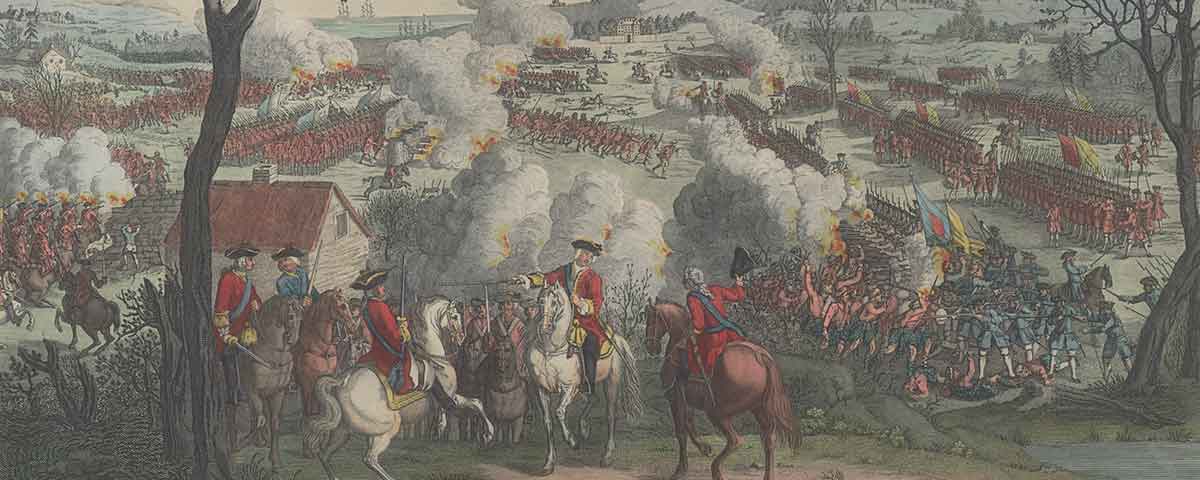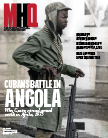MHQ, Spring 2016 Issue
PIQUED AT PRESTONPANS
I’m sorry, but what a terrible article was Ron Soodalter’s “Scots Peak at Prestonpans” (Summer 2015). This was not Scotland vs. England, and yet Soodalter describes the Jacobites as “Scots”: More Scots fought against the Jacobites than for them. The interchangeable England or Britain is annoying too. It was Great Britain and the British Army after 1707.
As for the “English” bayoneting the wounded “Scots,” that is complete disinformation on the part of the Scots Nationalists.
I suggest the author stick to writing fiction or Wild West stories.
John Graham
Tobermory, Isle of Mull, UK
RON SOODALTER RESPONDS:
While I am disappointed that the article was not to your liking, perhaps I can address your objections. First, I never claim that all of Scotland fought against King George. I make it clear from the outset that the rebellion was waged primarily by the Highland clans, and widely opposed in the Lowlands. (In the first paragraph, I refer to the “Highland clansmen” before ever using the word “Scots.”) I also describe, in great detail, the differences—and hostilities—between the Lowlanders and the Highlanders, making it clear that Charles Edward’s hope and expectation that the Lowland Scots would join his army were grossly and tragically unrealistic. However, the Highlanders were—and are—unquestionably Scots, and I see no reason not to refer to them as such. The very term “Jacobite” derives from the Latin for “James,” father and son, both of whom represented the Scottish Royal House of Stuart.
Second, I do not use the terms “English” and “British” interchangeably, nor am I unaware that 1707 marked the date of the much-hated Union between Scotland and England. Several decades later, however, the Scots themselves—both Highland and Lowland—were still speaking in terms of the “English.” Nor do I refer anywhere to the “English” army, but rather—from the very first sentence—to the “British army,” “British ranks,” “British military history,” “British grape and canister,” “British artillery,” “British government.” When I speak of the English, I am speaking specifically of those who lived in England. Ironically, the Highland clansmen, many if not most of whom spoke only Scots Gaelic, would not have referred to their foes as either English or British, but rather as Saxons, or in Gaelic, Sassenach.
Third, the pursuit and slaughter of the clansmen after Culloden is well documented and was ordered by the Duke of Cumberland himself—not a surprising turn, when we consider that he was fighting for the preservation of his father’s throne and saw the Highlanders as little more than savages. The destruction of the clan system, both as military expedient and long-range government policy, is a matter of record. I refer you to John Prebble’s excellent, well-researched, and highly readable book, Culloden, and its sequel, The Highland Clearances.
Fourth, in nearly seven decades, I have never written a single line of fiction, preferring the study of history—which I hope and believe I research thoroughly enough to justify my writing.
BOHEMIA AND THE HOLY ROMAN EMPIRE
It was with great surprise that I read Paul D. Lockhart’s statement in his story on the Battle of the White Mountain (Winter 2016) that “Bohemia did not belong to it” (the Holy Roman Empire, that is). The author might want to have a look at Wikipedia: “It was a kingdom in the Holy Roman Empire, and the King was a Prince-Elector of the empire until its dissolution in 1806. Many Kings of Bohemia were also elected Holy Roman Emperors.”
While the author does note that the empire had an “elected emperor,” he does not mention that there were only seven electors, with the king of Bohemia the highest ranking among them. (The others were dukes, counts, or archbishops.) One of those seven was Frederick V, Count Palatinate. Making him king of Bohemia by toppling their Habsburg king created three problems: For the first time ever, one individual held two electoral votes (out of only seven)—Palatinate and Bohemia; it flipped the majority in the electoral college from Catholic to Protestant in violation of the 1555 Peace of Augsburg accord (an earlier attempt in 1583, when the archbishop/elector of Cologne turned Protestant, resulted in his being forcefully removed from office and replaced by a Catholic during the Cologne War, 1583–1588); and it humiliated the Habsburgs who lost their prestigious seat on the electoral college. Under the code of honor of the time they had no choice but to win it back, one way or the other.
Kurt Lambert
Bonn, Germany
PAUL LOCKHART RESPONDS:
The Thirty Years’ War was bound up with the complexities of 17th-century politics, and that includes the labyrinthine constitution of the Holy Roman Empire. The Holy Roman emperor was indeed king of Bohemia, and as the “elector of Bohemia” he was one of the seven electors, but Bohemia—despite Wikipedia’s vast erudition—was not itself part of the empire, which is why the people of Bohemia weren’t subject to the religious clauses of the Peace of Augsburg, inter alia. The emperor’s title “elector of Bohemia” was a ceremonial title only and meant absolutely nothing for his kingdom. The laws of the empire were not binding on Bohemia (like the religious Peace of Augsburg); imperial institutions did not rule on Bohemian issues; and—probably most important—Bohemia was not attached to any of the 10 Reichskreise (Imperial Circles), the districts into which the Holy Roman Empire was divided.
GLORY ENOUGH FOR ALL
I enjoyed Willard Sterne Randall’s “Macdonough’s Gambit,” on the battle of Lake Champlain (Winter 2016), but since, at the end, he suggests a comparison between the importance of this triumph and the victory of Oliver Hazard Perry’s American fleet at the battle of Lake Erie, I would like to offer these points. Macdonough’s win certainly stopped an imminent British invasion, but so did Perry’s victory. Denied the use of Lake Erie, the British had to fall back, ending their desire to create an Indian “buffer state” in the Ohio Territory. Lake Erie directly led to the American control of the Great Lakes (excluding Lake Ontario), the recovery of Detroit, and the victory at Thames River, in which the great Indian leader, Tecumseh, was killed. Both Macdonough and Perry faced extreme difficulties in building their fleets from scratch, but Perry had the harder task, since his base at Put-In-Bay lacked the resources and facilities that Macdonough enjoyed. Perry’s supply line was not only considerably longer than Macdonough’s but it passed through the headquarters of his superior, Isaac Chauncey, who constantly siphoned off the best material and men. It is to Perry’s credit that he was able to build a fleet, that, yes, did outweigh its opponent. Finally, Macdonough appears to have enjoyed the loyal support of all his officers and did not have to deal, as Perry did, with a jealous and possibly mutinous Jesse Elliot, his second in command. I think there was glory enough for all, and the young America was equally well served by both Macdonough and Perry.
On display at the U.S. Naval Academy is one of the cannons seized by the Americans after Lake Champlain. It was, when I was a midshipman, outside Macdonough Hall. On its mouth can be seen a round indentation where it was struck by an American shot. It is the cannon, that when hit, flew back and killed the British commander, George Downie. Legend has it that Macdonough aimed that shot.
Theodore Kuhlmeier
San Antonio, Texas
CORRECTION
Apologies to our Drawn and Quartered contributor, collector Warren Bernard, for misidentifying the Winter 2016 image. It was actually the cover of a German children’s book (ca. 1943) and the correct translation of the title is “Who Wants to Be a Soldier.” MHQ
PHOTO: Seven months after their great victory at Prestonpans, Jacobite Highlanders were defeated by a seasoned British fighting force on a rain-driven moor at Culloden. Anne S.K. Brown Military Collection/Brown University Library
[hr]
This article originally appeared in the Spring 2016 issue (Vol. 28, No. 3) of MHQ—The Quarterly Journal of Military History with the headline: Comments | Piqued at Prestonpans.
Want to have the lavishly illustrated, premium-quality print edition of MHQ delivered directly to you four times a year? Subscribe now at special savings!






